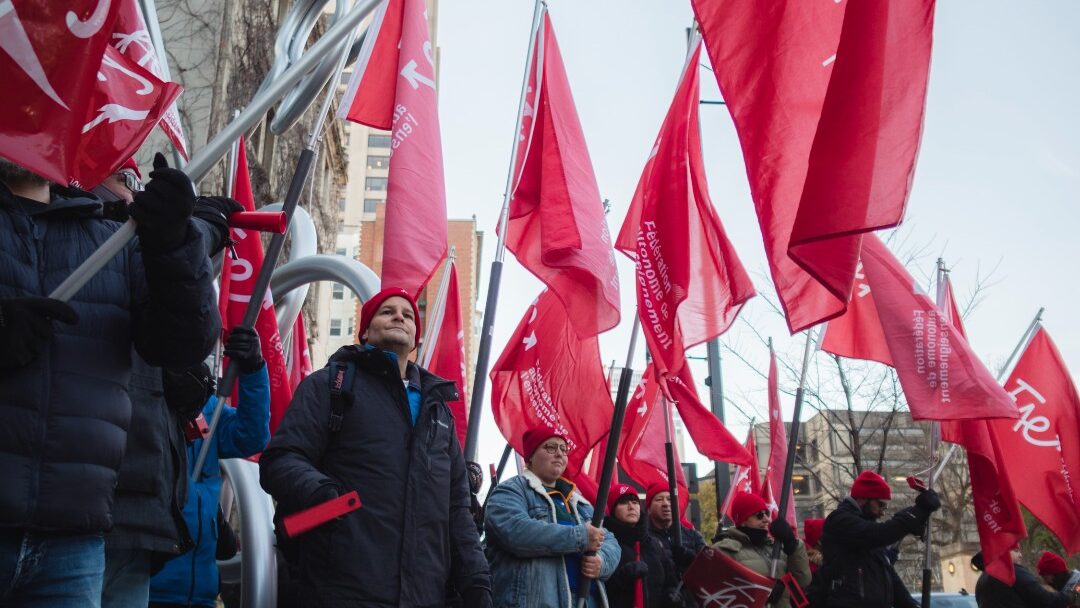The Autonomous Federation of Education (FAE), a federation of nine education unions representing 66,500 members, has announced that it will use its unlimited general strike mandate on November 23. The strike mandate is intended to break the deadlock in negotiations with the Treasury Board, which have been stagnating for a year now. The FEA indicated to the government that it was available to negotiate 7 days a week before November 23, but its offer went unanswered by management.
Sonia Lebel, President of the Treasury Board, tabled a final offer at the public service bargaining table at the end of October, following the announcement of a first day of strike action by the Front Commun. The gist of the offer was a 10.3% pay rise over 5 years, rather than the 9% initially proposed. This offer was denounced by all the unions present at the negotiating table, including the FEA.
Daniel Gauthier, FAE Vice-President to the Negotiations, said: "We're always ready to talk, but our confidence is eroding and it will be difficult for our members to remain calm in the face of the current offers, which look more like offers to leave. The gap between the government's new proposal and our members' needs is still very wide."
On the subject of negotiations, Ms. Lebel's office stated in early November, "the unions must come back to us with a serious and constructive counter-offer." However, the education unions have already made a major pruning of their demands in September. The FAE cut its demands to the government in half to break the deadlock in talks with the government. The Federation stresses that it has retained only those demands it considers to be priorities.
These include the question of salaries: Quebec teachers are paid below the Canadian average. For some teachers (at the beginning and middle of their careers), the gap with the average is almost 20%. For example, a teacher with 10 years' service has an $18,000 shortfall to make up in annual salary to reach the national average.
There's also the question of student assistance. FAE is calling for more support for students with special needs and their teachers. Students with special needs make up 34% of Quebec's public high school system, and their graduation rate is only 60%. The government, for its part, is proposing to withdraw the EHDAA classification from students with attention deficit disorder with or without hyperactivity (ADHD). This would have the effect of limiting access to certain resources for students and teachers of these students.
Some of FAE's demands require no additional investment on the part of the government. They are nonetheless rejected out of hand by the Treasury Board. This is the case, for example, with the FAE's request to allow teachers to complete their personal work hours (correction, planning) where and when they choose. The same applies to teleworking on pedagogical days.
Since the start of the school year, FAE-affiliated unions have been conducting mobilization campaigns. In particular, a "strike of zeal" that led to a boycott of open doors in several schools and weekly picketing activities. Most recently, the FAE demonstrated in front of Premier François Legault's office in Montreal.
On November 23, teachers affiliated to the FAE, members of the Front Common and the Fédération interprofessionnelle de la santé will be on strike. In all, more than 566,000 workers will be on strike. To mark this historic occasion, workers and unions will march together down Saint-Laurent Street in Montreal in the afternoon.
- Us Against the State: A Documentary on the United Front
- Quebec healthcare workers still without a contract
- Quebec unionized nurses reject “disrespectful” proposed deal
- “We could have fought together for better,” says FIQ member
- One in ten workers soon on strike?
- 1972, the Year Workers Shook the State
- Privatization in the name of “efficiency”
- Strike mandates accumulate with overwhelming support
- An Education Reform Deaf to the Key Issues
- FAE to call unlimited strike on November 23
- Québec government improvises solutions
- 100,000 workers in the street: “they’ve had enough”
- It’s Halloween for Quebec’s Public Employees, Or at Least for Some
- United Front workers determined to keep up the fight
- A historic movement, “we’ve never seen anything like it”
- The CAQ cares about kids (or so it says)
- Government treatment fuels “our indignation and will strengthen our mobilization”
- Superior Court Violates Teachers’ Right to Strike
- “Legault and all the others are destroying Quebec as we know it”


